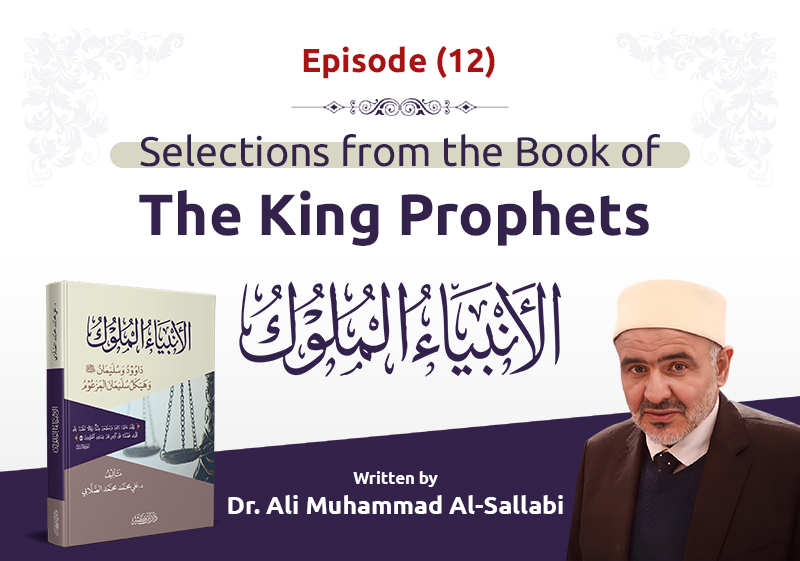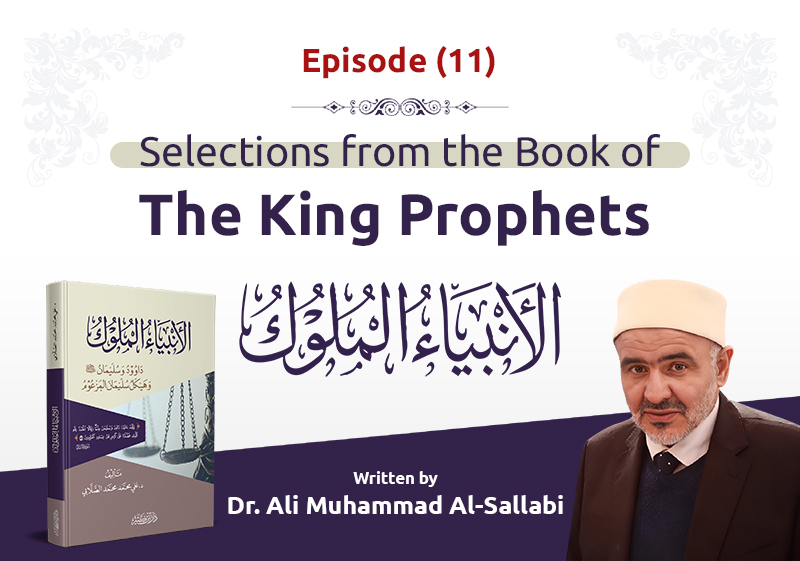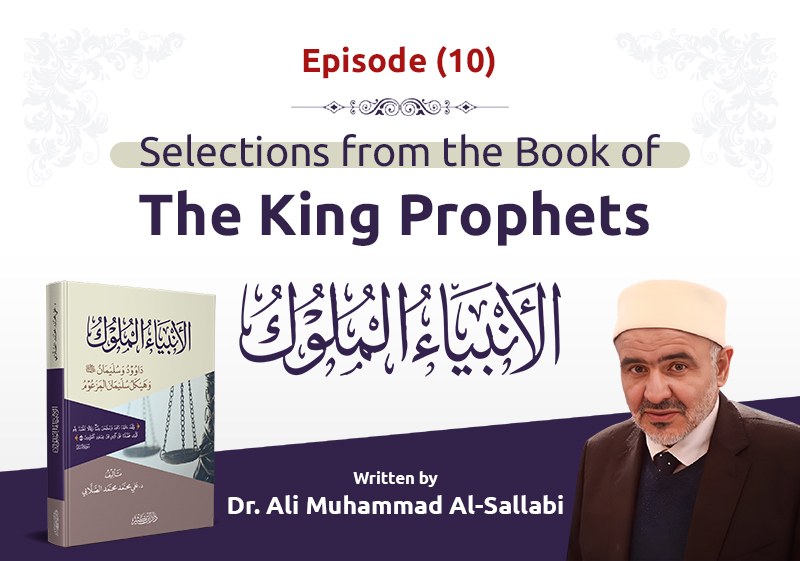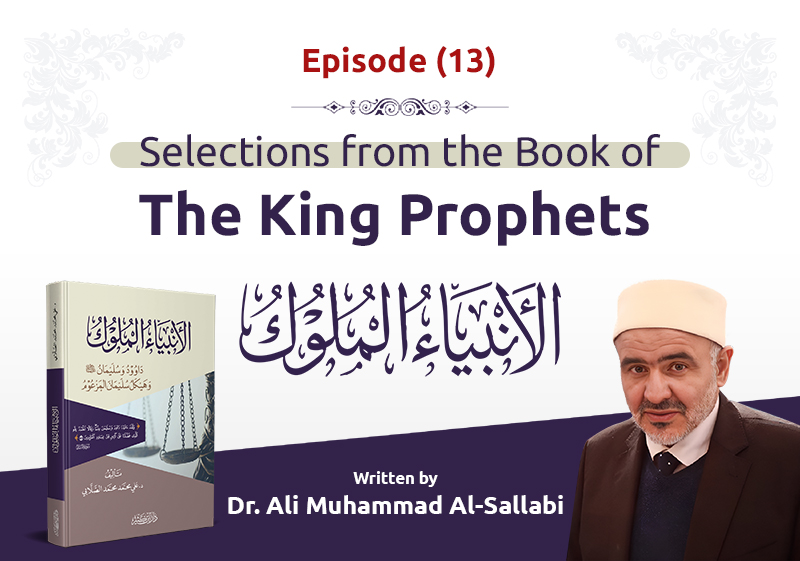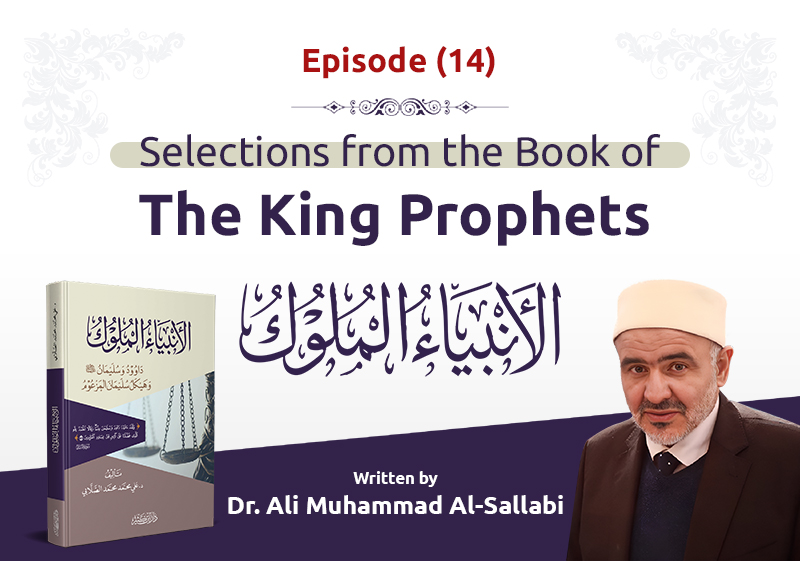Explaining the lie of the Children of Israel when they asked for a king to be sent over them.
Selections from the Book The King Prophets...
Written by Dr. Ali Muhammad Al-Sallabi...
Episode (12)
{And their prophet said to them, “Indeed, Allah has sent to you Saul as a king”}:
Allah Almighty mentioned their situation during the fight when they asked for it, so that Allah Almighty made clear the difference between words and actions among those who were overcome by humiliation and controlled by their desires, and then Allah Almighty began to mention the rest of the story and the lesson, meaning that Allah Almighty has brought out from your ranks - and He is the All-Knowing and All-Aware of your conditions - a person who has fulfilled all the requirements for leadership, and made him king over you.
The expression indicates that he is the best of them and the strongest to bear the burdens of governance, because “sent to you” includes the meaning of excitement, examination, and then ejection. What is apparently meant here by king; the owner of their affairs, and the one who is in charge of their kingship, and what is meant by it is not the conventional meaning, which is the one who takes charge of the dynasty. It will become clear that he was not chosen for his lineage, but rather he was chosen for his knowledge, wisdom, and strength, and the kingship did not continue in his descendants, but rather it devolved after him to the Prophet of Allah, David (peace be upon him).
As evidenced by the stories of David mentioned in the Holy Qur’an; Allah gave him kingship and rule, and he was chosen by Allah Almighty’s choice by what He revealed to His Prophet, and it was not by their choice, so that they do not compete, thus their strength between them will be severe instead of against their enemy.
There is no indication in the verse that the monarchy that we know in our time is required - neither in word nor in reference - because it is not the ownership of inheritance and lineage, but rather the leadership of knowledge, ability and wisdom. Saul was not chosen for his lineage, but rather he was chosen for the meanings of his personality in it.
What they asked of their Prophet to choose a king was that they should carry out without hesitation the command regarding what he chose, with Allah’s guidance and revelation, because they delegated the matter to their Prophet, and because Allah Almighty was the one who chose him, and they had no choice after Him, and because Allah Almighty chose him for their sake and for their benefit, and that is why Allah Almighty expressed it by saying: {Indeed, Allah has sent to you Saul as a king} the expression (to you) indicates that he is in your interest, and that you will benefit from his power, and his power will be yours over your enemies, but instead of obeying and taking the fear, they raised The harshness you are accustomed to; That is why Allah Almighty said a story about them:
{They said, “How can he have kingship over us while we are more worthy of kingship than him and he has not been given any measure of wealth?”}:
They rebelled against their Prophet with this objection, and they confirmed their objection after they delegated the matter, so they contradicted themselves, and based the objection on reasons that they made based on kingship and not on good leadership and strong kingship. They thought that the reason for kingship took two matters:
- {How can he have kingship}:
From what side did he derive the kingship? That is, he does not have royal blood in his veins that deserves to assume the kingship through him, and he is not of high lineage. Rather, any one of us is more deserving of the kingship than him, because he is not one of the nobles, and if we go beyond the honor of lineage and the honor of birth, we will find that he is poor and lacks wealth, so the two reasons for sovereignty were stolen from him: lineage and money.
This is how the thinking of groups that have been controlled by their desires and have taken over their affairs. They turn to material things, so those things rule them, and they lose appreciation for morale. Thus, the standards of appreciation become distorted. The first thing that afflicts weak groups is that their standards of greatness become distorted. If the measure of greatness is disturbed, the greats will be overwhelmed, and they will not appear except by coincidences or supernatural powers, and the greats in nations are the high peaks that guide to places of strength and raise pride from its place.
If you want to know a criterion for the progress of a nation, take it from its measure of greatness. At the time of this story, the children of Israel were at the peak of moral collapse, and this is indicated by their measure of greatness in lineage and money. In this noble sentence there are verbal topics to which we point out:
- The first: The Almighty’s saying: {How can he have kingship} How: It is used in the sense of (how), and it may be used in the sense of (from where). Here it may be in the sense of how, and the meaning is: How can he have kingship over us, and in any case this is justified and possible? It is an interrogative intended to completely exclude, meaning that it is not imaginable that someone like him could be a king? That is, he does not have any qualities, nor does he have any of the noble lineage in his family, which would make it permissible for him to be a king. What is meant by the question is to rule out that he contains any of the reasons justifying the king.
- The Second: The Almighty’s saying: {than him and he has not been given any measure of wealth} measure here is: abundance; The origin of abundance to be in place, action, and situation, and capacity in the situation is to be in a state of ability or money such that he is not restricted or in distress. So When He referred to the lack of money as distress, He referred to having plenty of money as abundance.
Episode references:
- Ali Muhammad Al-Sallabi, The King Prophets, pp. 71-74.
For further information and review of the sources for the article, see:
The Book of King Prophets on the official website of Sheikh Dr. Ali Muhammad Al-Sallabi:


